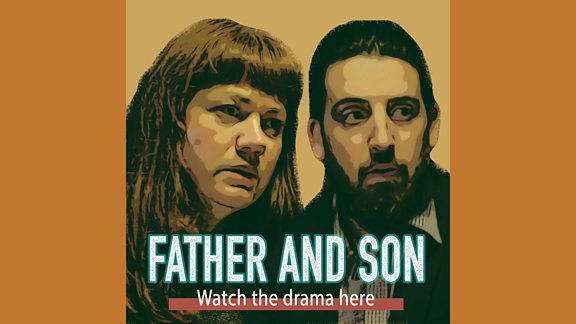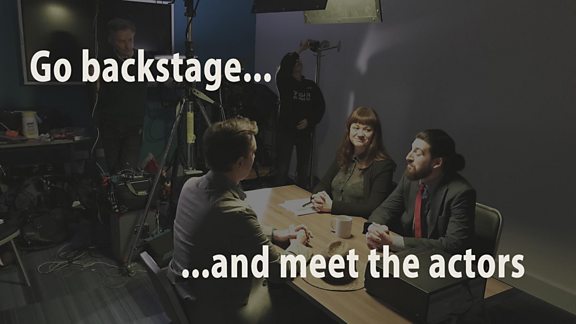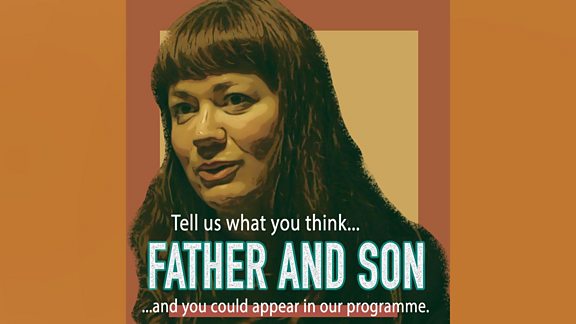Session 11
Watch our new crime drama, Father and Son and then learn more about the people involved with the making of it.
Session 11 score
0 / 0
- 0 / 0Activity 1
- 0 / 0Activity 10
- 0 / 0Activity 2
- 0 / 0Activity 3
- 0 / 0Activity 4
- 0 / 0Activity 5
- 0 / 0Activity 6
- 0 / 0Activity 7
- 0 / 0Activity 8
- 0 / 0Activity 9
Activity 5
Father and Son: Meet the writer again!
Part Two
It's time to meet the writer of the drama, Samara MacLaren, again. This time we get to hear about her tips for becoming a writer and much more.
Watch the video and complete the activity

Hi, I'm Samara MacLaren and I'm a writer and an actor, and I'm the writer of Father and Son.
I really admire Sally Wainwright. She's a really incredible writer. She started off writing for Coronation Street and possibly other soaps in... in Britain. And she did a big stint on those soaps and now she writes these big, meaty dramas for the BBC and for ITV. And she has such a great breadth of work: so, she's written things like Last Tango in Halifax, which is a very warm, sort of, quite comforting drama about an elderly couple that rekindle a teenage love affair. She's got Happy Valley, which is a very dark thriller set in Hebden Bridge and Halifax. She's got Scott and Bailey, which is procedural crime about two female detectives. And everything she writes is so warm and infused with such tenderness for her characters. She writes them so beautifully that, even the... even the villains that – in a show like Happy Valley, the... the baddy, if you like, is really unpleasant: you know, he's a really frightening character, but he still is written with such tenderness and warmth, because he's a human being and everybody in Sally Wainwright's shows are human beings. Nobody's a cardboard cut-out. They're all rich and detailed and... and full of life and... yeah, I think she's a really incredible writer.
This is a terrible question...! I... I have no idea! I really have no idea. I.. I don't really think... I don't think there is a character written, currently, that is me, which is good because I'll write it, hopefully, at some point. But... yeah, I don't know. There's lots of characters that as an actor I would like to play and there's lots of characters in my head that I still want to write, but yeah, I don't think there is somebody out there that I've seen on stage or on screen and thought, 'Oh my goodness, that's me!'
I do like to find certain phrases or words that might be my character's favourite words: so, things that they might like to say that... that, kind of, get repeated – that feel like a little 'in' into their character. So, something that Callie says at some point is, you know, 'We've got a bit... we've got a situation here.' This idea of it being a situation is a, sort of... is a word that I quite like. You know, what is this situation? What's going on? You know, and it's... it's just a way of using that word that she does, that not everybody does. But I don't... no, I don't have a particular... I don't have a something that I... that I really like, that's my... that I always try and put in a script. I... I try and be as varied as I can to make them different: to give my characters – to make my character different.
Well, I really like both of my detectives. The... Nikesh – I love Nikesh because he is... he's a new dad and he's really struggling with just having had no sleep and his whole life being turned upside down, and he's come back to work and this massive case has landed on him and he's... you know, he's trying really hard but he's got baby sick on his suit and he's... he's struggling to keep his brain in gear. So, I love him and I love Callie because she's really forthright and straight and determined, and she's very clear-headed and she says what she thinks and she doesn't... she doesn't shilly-shally about, but she also has her own eccentricities, which... which I really like. So, my two police officers are my... are my favourite characters.
If you want to be a writer, the first thing that you need to do is write. And nobody needs to give you any permission to do that; you can just sit down and write. If you want to be a writer who gets paid for their work, then you need to get your work out there. So, you might want to produce it as a play. You might want to film it and then post it online. There's loads of opportunities out there to send your work in and get it... and get feedback and then possibly get more support later on down the line. So, I've done a lot with the BBC Writersroom, who are an incredible organisation for supporting writers. The BBC Writersroom have loads of different opportunities for people at different stages in their career. The industry wants to find new writers. They need new writers and so there are lots of avenues available to find new writers, and you just need to seek them out and find the right one for you. The... actually, the other thing that I would say that is really useful is to find a mentor. If you possibly can, find somebody who is able to read your work, give you helpful advice and just, kind of, a bit of useful creative feedback is always... is always really useful. You don't want too many people reading your work and giving loads of different notes that are going to confuse you, but having a... having a mentor has been really invaluable to me, certainly.


